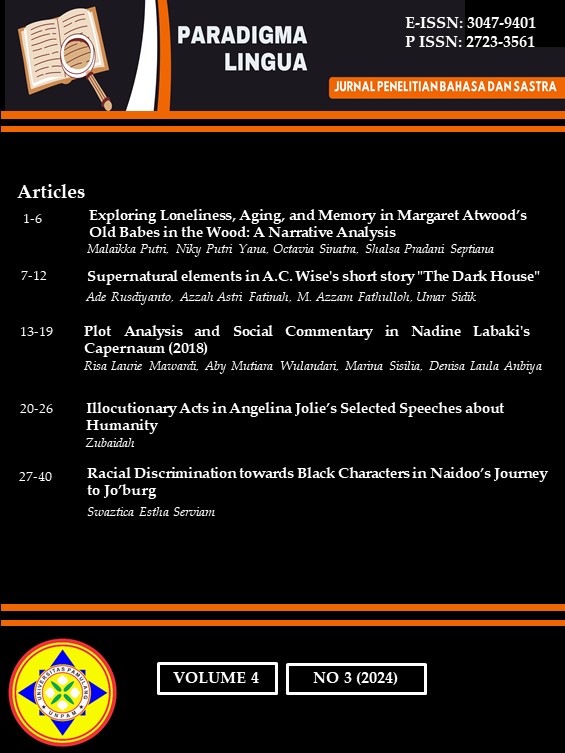Exploring Loneliness, Aging, and Memory in Margaret Atwood’s Old Babes in the Wood: A Narrative Analysis
Keywords:
aging, human condition, loneliness, Margaret Atwood, memory, narrative strategiesAbstract
This study explores Margaret Atwood's narrative strategies in depicting the complexities of human life, particularly in her short story Old Babes in the Wood. By employing a systematic literary analysis approach, the study delves into themes such as loneliness and aging, highlighting their relevance within the story and their potential to stimulate readers’ reflection on broader social and cultural contexts. Through the exploration of universal themes, the research demonstrates how literature can provoke critical thought regarding societal values and norms. Atwood’s narrative in Old Babes in the Wood offers deep insights into the intricate interplay between aging and memory, encouraging readers to reflect on life’s uncertainties and how individuals come to terms with their past while facing present realities. The study concludes that Old Babes in the Wood transcends personal struggles, serving as a broader reflection of the human condition.
References
Atwood, M. (2023). Old Babes in the Wood. McClelland & Stewart.
Brown, P., & White, D. (2022). "The Intersection of Aging and Memory in Contemporary Literature." Journal of Literary Studies, 45(3), 76-90.
Jones, L. (2020). "Time and Identity in the Works of Margaret Atwood." Modern Literature Review, 34(1), 112-130.
Miller, S. (2023). "Narrative Techniques in Atwood’s Short Stories: Analyzing Old Babes in the Wood." Literary Critique Today, 27(2), 101-118.
Roberts, A. (2022). "Mortality and Aging in Atwood’s Later Works." Journal of Aging and Literature, 18(4), 59-74.
Smith, K., & Johnson, R. (2021). "Exploring Memory in Margaret Atwood’s Fiction." Canadian Literature Journal, 55(2), 42-57.
Taylor, M. (2022). "Social Commentary through Fiction: Margaret Atwood’s Narrative Impact." International Journal of Literary Studies, 67(1), 88-97.
Williams, G. (2021). "Fragmented Memory and the Construction of Self in Atwood’s Old Babes in the Wood." Narrative Inquiry, 14(3), 135-149.
Downloads
Published
How to Cite
Issue
Section
License
Authors who publish with this journal agree to the following terms:
- Authors retain copyright and grant the journal right of first publication with the work simultaneously licensed under a Creative Commons Attribution License that allows others to share the work with an acknowledgement of the work's authorship and initial publication in this journal.
- Authors are able to enter into separate, additional contractual arrangements for the non-exclusive distribution of the journal's published version of the work (e.g., post it to an institutional repository or publish it in a book), with an acknowledgement of its initial publication in this journal.
- Authors are permitted and encouraged to post their work online (e.g., in institutional repositories or on their website) prior to and during the submission process, as it can lead to productive exchanges, as well as earlier and greater citation of published work (See The Effect of Open Access).
Paradigma Lingua have CC-BY-SA or an equivalent license as the optimal license for the publication, distribution, use, and reuse of scholarly work.
In developing strategy and setting priorities, Paradigma Lingua recognize that free access is better than priced access, libre access is better than free access, and libre under CC-BY-SA or the equivalent is better than libre under more restrictive open licenses. We should achieve what we can when we can. We should not delay achieving free in order to achieve libre, and we should not stop with free when we can achieve libre.


